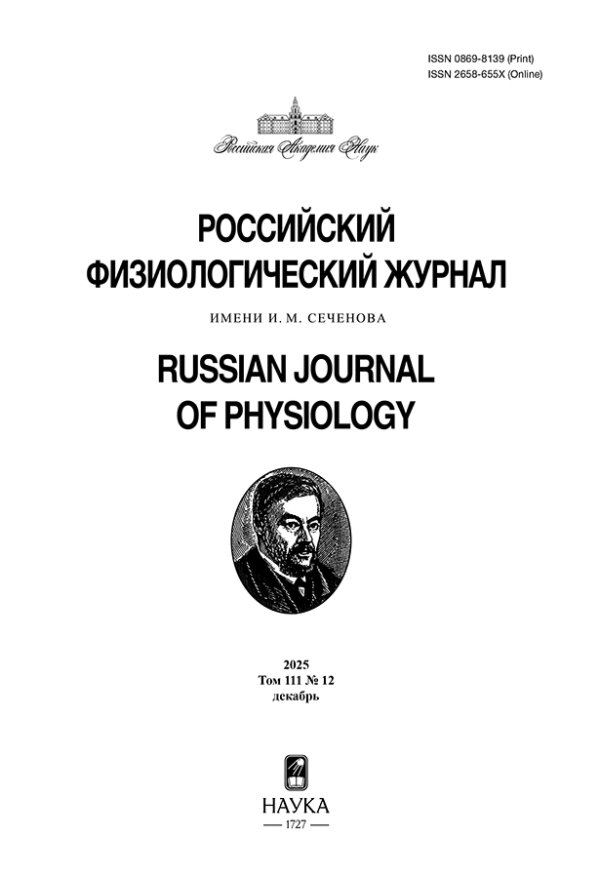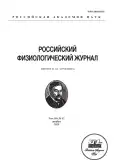Expression of Apoptosis and Autophagy Genes in HeLa and HEK 293 Cells under Conditions of Nutrient Deprivation
- Authors: Trubnikova A.D.1, Prokopenko E.S.1, Sokolova T.V.1, Nadei O.V.1, Agalakova N.I.1
-
Affiliations:
- Sechenov Institute of Evolutionary Physiology and Biochemistry, Russian Academy of Sciences
- Issue: Vol 109, No 12 (2023)
- Pages: 1856-1869
- Section: EXPERIMENTAL ARTICLES
- URL: https://journals.rcsi.science/0869-8139/article/view/233846
- DOI: https://doi.org/10.31857/S0869813923120117
- EDN: https://elibrary.ru/CHNZTJ
- ID: 233846
Cite item
Full Text
Abstract
The goal of the study was a comparing the degree of development of autophagy in the human cervical carcinoma cells of HeLa-V and HeLa-R sublines and non-tumor human embryonic kidney cells HEK 293 under two types of starvation conditions – 24- and 48-h culture in serum-free DMEM medium and 4-h incubation in Earle’s minimal medium. The work assessed cell viability using MTT method and the expression of apoptosis (BCL2, BAX, CASP3) and autophagy (ULK1, BECN1, ATG5, ATG14, MAP1LC3B) genes using real-time PCR. Cultivation under serum starvation and Earl’s medium resulted in a significant decrease in the viability of HEK 293 cells, but had no influence on HeLa-V and HeLa-R cells. In the tumor cells of both lines, the expression of anti-apoptotic gene BCL2 increased, while in HEK 293 cells the BCL2/BAX ratio decreased and CASP3 gene was activated. In HeLa-V and HeLa-R cells, nutrient deprivation induced the stimulation of various combinations of genes ULK1, BECN1, ATG5 and ATG14 implicated in the initial stages of autophagy, but none of the treatments affected the expression of MAP1LC3B gene. In HEK 293 cells, serum starvation led to increase in expression level of BECN1, ATG5, ATG14 and MAP1LC3B genes. Thus, stimulation of autophagy in HeLa cells, especially HeLa-R, prevents the development of apoptotic processes, while in HEK 293 cells the processes of apoptosis and autophagy occur in parallel. Culture in the serum-free DMEM for 48 h appears to be most effective way to induce autophagy in tumor cell lines and, accordingly, the most suitable model for studying the role of autophagy in the development of their resistance to apoptotic pathway of death.
Keywords
About the authors
A. D. Trubnikova
Sechenov Institute of Evolutionary Physiology and Biochemistry, Russian Academy of Sciences
Email: nagalak@mail.ru
Russia, Saint-Petersburg
E. S. Prokopenko
Sechenov Institute of Evolutionary Physiology and Biochemistry, Russian Academy of Sciences
Email: nagalak@mail.ru
Russia, Saint-Petersburg
T. V. Sokolova
Sechenov Institute of Evolutionary Physiology and Biochemistry, Russian Academy of Sciences
Email: nagalak@mail.ru
Russia, Saint-Petersburg
O. V. Nadei
Sechenov Institute of Evolutionary Physiology and Biochemistry, Russian Academy of Sciences
Email: nagalak@mail.ru
Russia, Saint-Petersburg
N. I. Agalakova
Sechenov Institute of Evolutionary Physiology and Biochemistry, Russian Academy of Sciences
Author for correspondence.
Email: nagalak@mail.ru
Russia, Saint-Petersburg
References
- Chern YJ, Tai IT (2020) Adaptive response of resistant cancer cells to chemotherapy. Cancer -Biol Med 17(4): 842–863. https://doi.org/10.20892/j.issn.2095-3941.2020.0005
- Noguchi M, Hirata N, Tanaka T, Suizu F, Nakajima H, Chiorini JA (2020) Autophagy as a modulator of cell death machinery. Cell Death Dis 11: 517. https://doi.org/10.1038/s41419-020-2724-5
- Thorburn A (2018) Autophagy and disease. J Biol Chem 293(15): 5425–5430. https://doi.org/10.1074/jbc.R117.810739
- Goldsmith J, Levine B, Debnath J (2014) Autophagy and cancer metabolism. Methods Enzymol 542: 25–57. https://doi.org/10.1016/B978-0-12-416618-9.00002-9
- Zhang T, Yu J, Cheng S, Zhang Y, Zhou CH, Qin J, Luo H (2023) Research Progress on the Anticancer Molecular Mechanism of Targets Regulating Cell Autophagy. Pharmacology 108(3): 224–237. https://doi.org/10.1159/000529279
- Rahman MA, Saikat AS, Rahman MS, Islam M, Parvez MA, Kim B (2023) Recent Update and Drug Target in Molecular and Pharmacological Insights into Autophagy Modulation in Cancer Treatment and Future Progress. Cells 12(3): 458. https://doi.org/10.3390/cells12030458
- Su M, Mei Y, Sinha S (2013) Role of the Crosstalk between Autophagy and Apoptosis in Cancer. J Oncol 2013: 102735. https://doi.org/10.1155/2013/102735
- King KE, Losier TT, Russell RC (2021) Regulation of Autophagy Enzymes by Nutrient Signaling. Trends Biochem Sci 46(8): 687–700. https://doi.org/10.1016/j.tibs.2021.01.006
- Kong EY, Cheng SH, Yu KN (2018) Induction of autophagy and interleukin 6 secretion in bystander cells: metabolic cooperation for radiation-induced rescue effect? J Radiat Res 59(2): 129–140. https://doi.org/10.1093/jrr/rrx101
- Bampton ET, Goemans CG, Niranjan D, Mizushima N, Tolkovsky AM (2005) The dynamics of autophagy visualized in live cells: from autophagosome formation to fusion with endo/lysosomes. Autophagy 1(1): 23–36. https://doi.org/10.4161/auto.1.1.1495
- Chen Y, Azad MB, Gibson SB (2009) Superoxide is the major reactive oxygen species regulating autophagy. Cell Death Differ 16(7): 1040–1052. https://doi.org/10.1038/cdd.2009.49
- Racz GA, Nagy N, Tovari J, Apati A, Vertessy BG (2021) Identification of new reference genes with stable expression patterns for gene expression studies using human cancer and normal cell lines. Sci Rep 11: 19459. https://doi.org/10.1038/s41598-021-98869-x
- Rao X, Huang X, Zhou Z, Lin X (2013) An improvement of the 2^(-delta delta CT) method for quantitative real-time polymerase chain reaction data analysis. Biostat Bioinforma Biomath 3(3): 71–85.
- Eichhorn JM, Alford SE, Sakurikar N, Chambers TC (2014) Molecular analysis of functional redundancy among anti-apoptotic Bcl-2 proteins and its role in cancer cell survival. Exp Cell Res. 322: 415–424. https://doi.org/10.1016/j.yexcr.2014.02.010
- Singh R, Letai A, Sarosiek K (2019) Regulation of apoptosis in health and disease: the balancing act of BCL-2 family proteins. Nat Rev Mol Cell Biol. 20: 175–193. https://doi.org/10.1038/s41580-018-0089-8
- Dixit VM (2023) The road to death: Caspases, cleavage, and pores. Sci Adv 9(17): eadi2011. https://doi.org/10.1126/sciadv.adi2011
- Sahoo G, Samal D, Khandayataray P, Murthy MK (2023) A Review on Caspases: Key Regulators of Biological Activities and Apoptosis. Mol Neurobiol 60(10): 5805–5837. https://doi.org/10.1007/s12035-023-03433-5
- Lamark T, Johansen T (2021) Mechanisms of Selective Autophagy. Annu Rev Cell Dev Biol 37: 143–169. https://doi.org/10.1146/annurev-cellbio-120219-035530
- Majeed ST, Majeed R, Andrabi KI (2022) Expanding the view of the molecular mechanisms of autophagy pathway. J Cell Physiol 237(8): 3257–3277. https://doi.org/10.1002/jcp.30819
- Rong Z, Zheng K, Chen J, Jin X (2022) Function and regulation of ULK1: From physiology to pathology. Gene 840: 146772. https://doi.org/10.1016/j.gene.2022.146772
- Vega-Rubín-de-Celis S (2019) The Role of Beclin 1-Dependent Autophagy in Cancer. Biology 9(1): 4. https://doi.org/10.3390/biology9010004
- Prerna K, Dubey VK (2022) Beclin1-mediated interplay between autophagy and apoptosis: New understanding. Int J Biol Macromol 204: 258–273. https://doi.org/10.1016/j.ijbiomac.2022.02.005
- Menon MB, Dhamija S (2018) Beclin 1 Phosphorylation – at the Center of Autophagy Regulation. Front Cell Dev Biol 6: 137. https://doi.org/10.3389/fcell.2018.00137
- Ohashi Y (2021) Activation Mechanisms of the VPS34 Complexes. Cells 10(11): 3124. https://doi.org/10.3390/cells10113124
- Zhou P, Zhang Z, Liu M, Li P, Zhu Y (2023) Effects of autophagy‑related gene 5 on tumor development and treatment (Review). Oncol Rep 50(2): 155. https://doi.org/10.3892/or.2023.8592
- Changotra H, Kaur S, Yadav SS, Gupta GL, Parkash J, Duseja A (2022) ATG5: A central autophagy regulator implicated in various human diseases. Cell Biochem Funct 40(7): 650–667. https://doi.org/10.1002/cbf.3740
- Chen KD, Lin CC, Tsai MC, Huang KT, Chiu KW (2018) Tumor microenvironment mediated by suppression of autophagic flux drives liver malignancy. Biomed J 41(3): 163–168. https://doi.org/10.1016/j.bj.2018.03.002
- Tanida I, Ueno T, Kominami E (2004) LC3 conjugation system in mammalian autophagy. Int J Biochem Cell Biol 36(12): 2503–2518. https://doi.org/10.1016/j.biocel.2004.05.009
Supplementary files
















